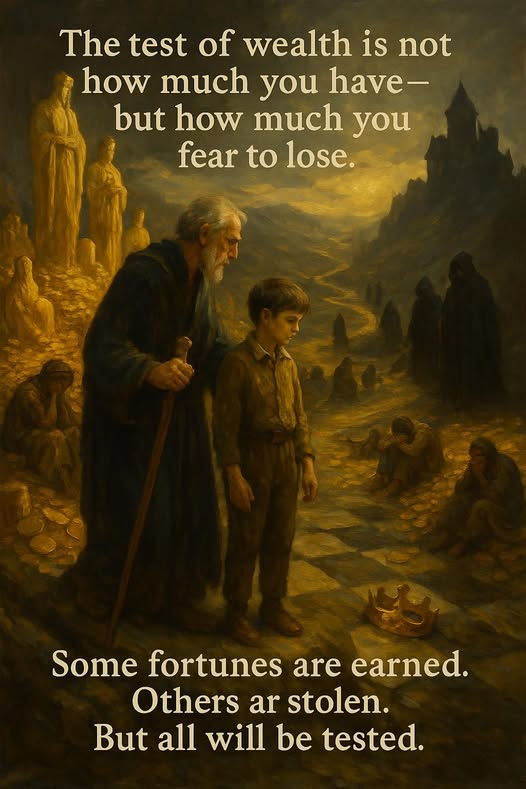
The sun filtered through the ancient trees as Emil and his grandfather wandered through a forest path that sparkled with drops of light. Between the roots, glimmers of coins, jewels, and keys poked through the soil—some clean, others rusted, some broken.
“Why are they buried here?” Emil asked, crouching beside a patch of golden coins.
His grandfather replied without slowing his pace.
“Because this is where the world hides its treasures… and its temptations.”
Emil stood, brushing off his hands. “Are they cursed?”
“Not the coins themselves,” his grandfather said gently, “but the hearts that cling too tightly to them.”
They walked further until the path opened into a wide field. There stood statues—men and women—frozen in reaching, grabbing, clenching. Some were smiling, others crying. A few were shackled by chains made of gold.
Grandfather continued, his voice low and firm.
“Wealth is not the enemy. But it’s never neutral. It asks questions of the soul.
What will you give to gain it?
Who will you forget to keep it?
What will you become to defend it?”
Emil hesitated. “So the more you have, the harder the test?”
“Sometimes. But not always. The real test is not how much you have—
but how much you fear to lose.”
They paused at a statue of a man with one hand clutching a sack, the other held out as if offering.
“And some,” Grandfather added, “never intended to pass the test at all. They didn’t earn wealth—they took it.”
Emil looked closer. “You mean stealing?”
“Yes. And lying. Extorting. Misusing what wasn’t theirs. Cloaking corruption in clever deals. Calling theft by nicer names.”
He walked slowly now, looking Emil in the eyes.
“Wealth gained unjustly is a slow poison. It blinds the soul, strangles compassion, and buries truth beneath luxury.”
“But some people live like kings,” Emil said, “and no one stops them.”
“They are not free. They may seem powerful, but their wealth is their master. Fear follows them. Emptiness haunts them.
No one truly escapes justice—not in this world, or the next.”
They reached the end of the field, where one last statue stood—this one different. It showed a child offering a coin to another, both smiling, free of chains.
“Wealth is not what you hold in your hands,” Grandfather said,
“but what doesn’t hold your heart.”
Grandfather closed his eyes for a moment.
“Wealth can corrupt the hand that takes it wrongly,” he said. “But even honest wealth has its own trap.”
Emil tilted his head.
“What trap?”
“The comfort that whispers: rest now… you’ve earned enough to forget the world’s pain.”
He looked Emil in the eye.
“And so begins the next test.”

